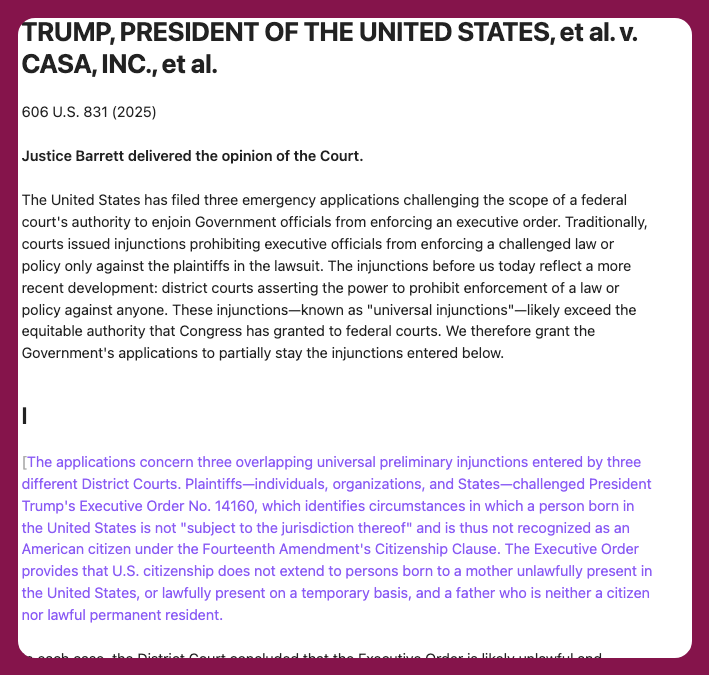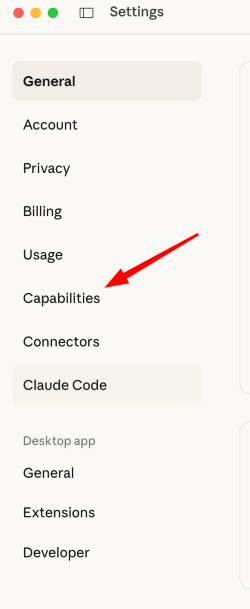Use Claude Skills to Write Your Casebook

How Professor Chandler might have killed a good chunk of the legal publishing industry in about 10 minutes
Writing a traditional legal casebook is an immense scholarly and pedagogical effort. It requires an author to possess encyclopedic knowledge of a subject, allowing them to sift through thousands of cases to select the few that perfectly illustrate a doctrine's origin, evolution, and modern application. This selection is only the start. The author must then meticulously abridge these cases—a precise art in itself—and, crucially, write the surrounding notes, questions, and commentary. The result should be a coherent, teachable narrative that guides students from ignorance to sophistication.
But what if all you really needed was the expertise to know which cases were important and could let a very skilled research assistant, an AI, undertake the tedious but intellectually challenging task of boiling the case down to your desired essence?
Now, I believe, you can.
Maybe it's not quite yet the time when an AI can select the cases for you, but I believe at least one AI, a capability-enhanced version of Claude from Anthropic, can now make a very strong first cut at editing the cases. As a result of some work I have done, Claude now has the ability to take a complete legal opinion – even a long one – and edit it with fairly brief directions to resemble the abridged version typically found in legal casebooks.
The new technology that enables what previously was challenging even for sophisticated AI is the Claude "Skill." Basically, Claude acquires knowledge on how to perform complex tasks previously the exclusive province of humans and replicates it. Building the skill is not trivial, but once an expert (like me) has created the skill and been thoughtful enough to make it available, anyone can take advantage of the builder's expertise. In about 10 minutes, Claude can combine a fairly basic prompt from a human casebook author and a prebuilt skill and abridge a new 120-page Supreme Court suite of opinions in a case down to a coherent 12-page version more suitable for law students who lack time to enjoy the entire document.
Here's proof. I show you here the prompt, which will win no prizes for elegance, and the result, which I believe is competitive with human editors. The opinion in question is Trump v. CASA, a recent case discussed elsewhere in this blog dealing with the power of federal courts to extend the protection of an injunction issued in a case to non-parties.
Use the casebook editor skill to edit this opinion. In addition to the most obvious stuff from Justice Barrett's majority opinion, make sure it is clear to students what the consequences of the ruling are. Make sure to include the concurrences of Justices Alito and Thomas, which attempt a preemptive strike against various potential evasions of the ruling. Make sure the dissenting justices' perspectives on the real world consequences of the ruling are spelled out. Anything that addresses the ability of Congress to pass laws changing the ruling are important too. The student reading this opinion should realize that the court did not issue a definitive ruling on the scope of federal court power under Article III. I am looking for a Markdown file of about 5000 words.
And here is a screenshot of the first part of the result, which by default is a Markdown file that can readily be converted to other formats, including Microsoft Word and PDF. (Indeed, the Skill permits you to override the default preference for Markdown and just get a downloadable Word file directly).

You can see that the editor has placed in brackets and color coded materials that it has added to shorten various passages whose length exceeds its pedagogical value. The abridged opinion contains the concurrences of Justices Alito and Thomas and the dissents of Justices Sotomayor and Jackson. It has likewise preserved various vivid passages from the original. The entire Claude-created opinion is available here.
Note that Claude preserved some of the most vivid lines from each opinion:
Justice Barrett's Majority Opinion:
- "By the end of the Biden administration, we had reached 'a state of affairs where almost every major presidential act [was] immediately frozen by a federal district court.'" - Sets up the practical stakes
- "[Y]ou cannot have an injunction except against a party to the suit" - The key historical equity principle (from Iveson v. Harris)
- "Their absence from 18th and 19th century equity practice settles the question of judicial authority." - The dispositive historical point
- "When a court concludes that the Executive Branch has acted unlawfully, the answer is not for the court to exceed its power, too." - The majority's framing of institutional restraint
Justice Thomas's Concurrence:
- "Complete relief is not a guarantee—it is the maximum a court can provide" - Reframes the "complete relief" principle as a ceiling, not a floor
- "Courts may not use the complete-relief principle to revive the universal injunction." - Warning against evasion
- "If they cannot do so, this Court will continue to be 'dutybound' to intervene." - A threat of ongoing supervision
Justice Alito's Concurrence:
- "Putting the kibosh on universal injunctions..." - Unusually casual phrasing for the Supreme Court
- "Otherwise, the universal injunction will return from the grave under the guise of 'nationwide class relief,' and today's decision will be of little more than minor academic interest." - Vivid metaphor about zombie injunctions
- "Left unchecked, the practice of reflexive state third-party standing will undermine today's decision as a practical matter." - Warning about the state-as-plaintiff workaround
Justice Jackson's Dissent:
- "the power-hungry actors are ... (wait for it) ... the district courts" - Dripping with sarcasm about the majority's framing
- "a court's power to prevent constitutional violations comes with an asterisk—a court can make the Executive cease its unconstitutional conduct but only with respect to the particular plaintiffs named in the lawsuit" - Captures the practical limitation
- "Make no mistake: Today's ruling allows the Executive to deny people rights that the Founders plainly wrote into our Constitution, so long as those individuals have not found a lawyer or asked a court in a particular manner to have their rights protected." - States the stakes plainly
- "In essence, the Court has now shoved lower court judges out of the way in cases where executive action is challenged" - Vivid physical metaphor
- "our beloved constitutional Republic will be no more" - Apocalyptic conclusion
- "[W]ith all its defects, delays and inconveniences, men have discovered no technique for long preserving free government except that the Executive be under the law" - The Youngstown quote (Justice Robert Jackson) that frames executive accountability
Great! How do I get Claude to do this?
Assume you are persuaded that this new Claude Skill can create a useful first and maybe near-last cut at an abridged case. Assume you have decided that it enables you to write casebooks on areas perhaps too narrow to be otherwise warranted (Maritime Insurance, The Texas Constitution, Comparative Public Health Law) or to take a classic subject such as Business Organizations, Evidence, or Family Law and give it your own special spin. How do you actually get it done?
No one ever said it was free. The first thing you need is a paid Claude account. Fork over $20 per month to Anthropic for the "Pro" plan until the job is done (unless your school is enlightened enough to have some sort of site license). Indeed, because of Claude's rate limiting, if you plan to work on this project intensively, you might need to upgrade to the $100 per month "Max" plan. Hopefully, you will make it back in royalties or a compensating sense of pride in having orchestrated a casebook.
You then need a ZIP file that contains the instructions for the particular Claude "Skill." Here's the ZIP file you need to edit cases. It's for subscribers only. (I can't believe I am giving this away for free!) That ZIP file can contain numerous items, including computer code that may be needed to help execute your project. Claude may need, for example, to understand how to intelligently chunk or prioritize work, which may in turn require functions available in Python or JavaScript not readily replicable purely in a Large Language Model. The ZIP file also contains a file called SKILLS.md that describes at length and in English what Claude is supposed to do.
To use the ZIP file, all you do is go to Settings in Claude. And press "Capabilities."

Then scroll down until you see the "Skills" section. If you have not previously uploaded the ZIP file, press the Upload Skill button (inside my magenta box) and choose the correct file from your system. If you have previously uploaded the ZIP file and you see Casebook Editor listed as a skill, just toggle the switch (pointed to with my magenta arrow) to make sure it is activated. (If you're not using it, you might think about turning it off; no point clogging up Claude's capabilities with too many tools.)

And that's it! The technology is elegant and intuitive, dare I say beautiful.
Once the Skill has been added to Claude's capabilities, give it a copy of the legal opinion in question and just type in your prompt in the usual way. You can also set a word limit (as I did), emphasize points to cover (as I did), decide on an output format (Markdown is the default), or do almost anything else (translate the excerpts into Spanish). Here's my prompt – hardly a work of exceptional genius – and a screenshot of the result.
Could you now produce a 1000 word version of the opinion but translate all of the excerpted passages into Spanish. Give the student the best idea possible of what the case is about. Output should be a Word document.

Making your own Skill or editing a Skill
Perhaps you don't like the output produced by the Skill I created? Perhaps you want Claude to add the usual notes that often follow edited opinions? Perhaps you want Claude to have an entirely different skill: a skill to produce strong essay questions for law school exams from a set of materials. The good news is that Claude has a Skill that is designed to build Skills! Just go into the settings and make sure it is turned on. Then give Claude the best possible idea of what you ultimately want and tell it to build a skill. And here is the part where you really do want to use your brain and perhaps collaborate interactively with an AI before making the final ask of the Claude skill builder.
The process I used to build the casebook editor illustrates the work you will likely need to undertake to produce a robust Claude Skill. For no particular reason, I started with another AI: Gemini. Here are the two prompts I provided.
Prompt 1
I want you to think about casebook editing of the sort done by law professors. It’s actually a very complex intellectual task trying to condense a long opinion into excerpts plus explanatory text. What are the consideration and choices made. What does the professor have to know to do this well.
Prompt 2
How would you instruct an AI to edit a case and what would be some of the weaknesses of an AI that the professor would need to try to overcome?
I then went back to Claude, activated the Skill Creation Skill, pasted in the Gemini responses to those two queries, and wrote the following:
Claude. I want you to create a skill. I want you to be able to take a legal case opinion and edit it for a professor so that it is suitable for placement in a traditional casebook. Inputs you should receive at a minimum are the text of the opinion, the desired length of the opinion either as a fraction of the original or some word count (legal opinions can be > 50,000 words) , and the reason the case is being included in the casebook. Here are some additional considerations that you will need to think about. Here is a discussion of the intellectual activity: %%% And here is a very rough idea of things you might have to do: %%% Do not treat either of these as "gospel" that you must follow. It is just some rough ideas from an inferior AI.
About 10 minutes later I had the needed ZIP file, which I could download to my system and then feed back in as a skill or give to others to enable them to do the same. I wish I could impress you by suggesting that there was more to it than that. But there wasn't. Claude did all of the heavy lifting.
What's Next?
Those of you who looked carefully at a previous screen capture will note that the R&D division at legaled.ai has many other skills in the pipeline. There's a law review article editor in the works that looks very promising. There's also a sophisticated hallucination checker that is running into some issues. I hopeit will emerge as a tool that liberates use of generic AI such as ChatGPT in law without total fear of hallucination.
For now just appreciate that AI has just taken another leap in capabilities: the ability to do a pretty decent job in an area previously the exclusive preserve of humans: casebook editing. Will this, as I only half-facetiously suggested at the start of this entry, kill a good chunk of the legal publishing industry devoted to construction and publication of casebooks at extremely high rates? Maybe not quite yet. Will it cause professors who have authored casebooks involving thousands of hours of work to now bang their heads against the wall or curse the day Claude Skills emerged. I hope not. But given the pace at which the capabilities of AI are accelerating, I wonder indeed if those days are not far off.
